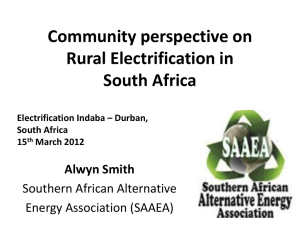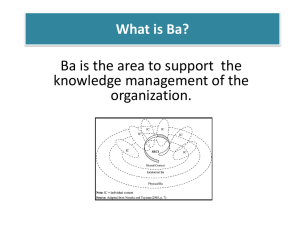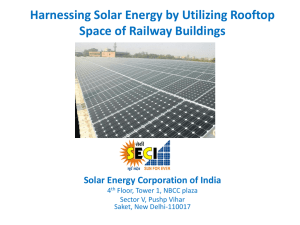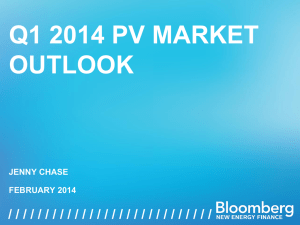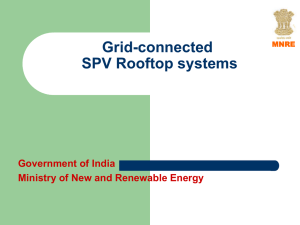SOLAR ENERGY: CHALLENGES AND OPPORTUNITIES
advertisement
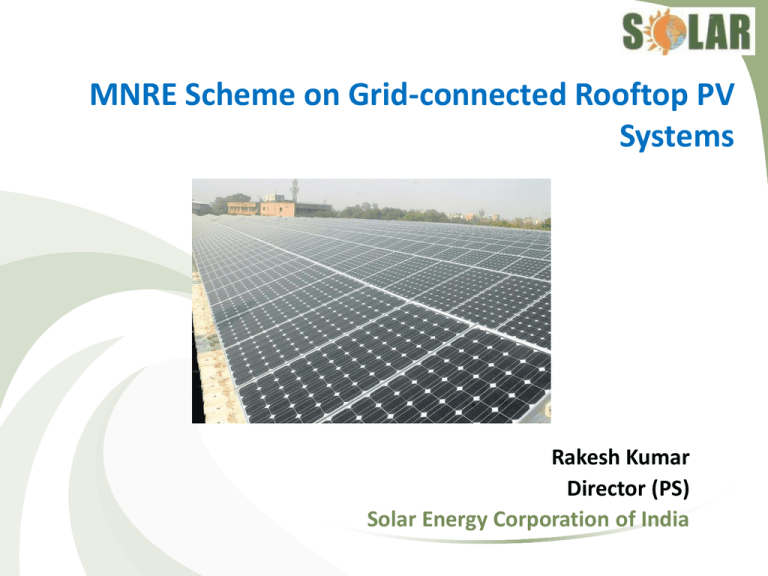
MNRE Scheme on Grid-connected Rooftop PV Systems Rakesh Kumar Director (PS) Solar Energy Corporation of India SECI- Inception and Objectives OUR MANDATE: A Government of India Enterprise under the administrative control of MNRE To assist MNRE in executing the National Solar Mission objectives To plan and execute an integrated programme on development and deployment of solar energy Incorporated on 20th September, 2011 as a “Not for profit” Company under Section 25 of the Companies Act, 1956 technologies to achieve commercialization; Authorised capital INR 2,000 Crores; Paid up capital INR 21 Crores for FY2012-13 both grid-connected & off-grid power stations; 7-Apr-15 To own, operate and manage, SOLAR ENERGY CORPORATION OF INDIA To promote R&D in Solar 2 SECI- Ongoing Activities 750 MW PV projects under JNNSM Phase II, Batch I • 750 MW of Large scale projects (10-50 MW) • Upto 30% VGF funding support • Projects to be selected through reverse bidding process • Developers to be offered tariff of Rs. 5.45 per unit Implementation of Solar Roof-Top scheme • To be discussed subsequently Large scale solar plants including Ultra-mega project at Sambhar • 1000 MW PV plant coming up through JV route; capacity to be ramped up to 4000 MW • SECI to be major stakeholder in the project • Upto 30% VGF funding support 7-Apr-15 SOLAR ENERGY CORPORATION OF INDIA 3 Contd… Solar Mini/Micro Grids • Aims to provide energy access to remote villages • Funded through CSR of major PSUs • To be awarded through competitive bidding Supply of low cost solar lanterns • High quality low-cost lanterns targeted for rural population • Funded through CSR of major PSUs • Cost discovered through Competitive bidding Solar Thermal installations for water/air heating • Covering 25 schools in remote locations • Subsidy to be provided by MNRE Pilot Solar Thermal Power Plants • Large scale CSP projects with different configurations • SECI to own these projects 7-Apr-15 SOLAR ENERGY CORPORATION OF INDIA 4 Growth of Solar Capacity in India (MW) 1809 Solar Capacity (MW) 1684 936 3 11 36 2008-09 2009-10 2010-11 2011-12 2012-13 2013-14 State Gujarat Rajasthan Maharashtra Madhya Pradesh Andhra Pradesh MWp 857.9 601.2 160 % 47.42 33.23 8.84 37.3 2.06 33.2 1.84 Uttar Pradesh 17.4 Tamil Nadu Jharkhand Karnataka Orissa Punjab Haryana West Bengal A & N Island Uttarakhand Chhattisgarh Delhi 17.1 16 14 13 9.3 7.8 7.1 5.1 5.1 4 2.6 Lakshadweep 0.8 0.96 0.95 0.88 0.77 0.72 0.51 0.43 0.39 0.28 0.28 0.22 0.14 0.04 Moving Towards grid parity Source:KPMG By 2016-17, roof top solar power cost will reach the grid parity. 7-Apr-15 SOLAR ENERGY CORPORATION OF INDIA 6 Why Rooftop PV • On national level, reduces requirement of land for addition of solar capacities • For consumers, it – Reduces the dependency on grid power – Mitigates diesel generator dependency – Long term reliable power source • For Discoms, it reduces – Day Peak load Demand – T&D and conversion losses as power is consumed at the point of generation • Most suitable for commercial establishments – Max generation during peak usage time – Solar power cost is close to the commercial power cost Roof top PV potential in India • According to 2011 Census India has: – 330 million houses – 166 million electrified houses – 76 million houses use kerosene for lighting – 1.08 million houses use solar for lighting – 140 million houses with proper roof (Concrete or Asbestos / metal sheet) – 130 million houses having > 2 rooms • Average houses can accommodate 1-3 kWp of solar PV system • Large commercial roofs can accommodate larger capacities • As a conservative estimate, about 25 GW capacity can be accommodated on roofs of buildings having > 2 rooms alone (considering 20% roofs are available/suitable) Rooftop PV Programmes under JNNSM • Small scale rooftop PV systems – Size: less than 100 kWp – Implemented through MNRE Channel Partners – Generally in off grid mode •Large scale rooftop PV scheme – Size: 100 to 500 kWp grid-connected systems (without battery back up) – Implemented through SECI through a process of competitive bidding – 3 Phases announced; Phase I: 5.5 MW (4 cities); Phase II: 11.3 MW (6 cities); Phase III: 10 MW (9 cities)… more to come – Possible locations include public buildings, hospitals, educational institutions, warehouses etc. MNRE’s Large-scale Rooftop PV Scheme 30% subsidy available from MNRE Chandigarh (1) Projects being set up in select cities Gurgaon (2) Noida/Greater Noida (1.5) New Delhi (2) Project capacity: Jaipur (3.25) Phase I: under implementation Phase II: Rooftop identification in progress Gwalior (1) Phase III: Projects in bidding and evaluation stage Legend 7-Apr-15 Phase I Phase II Phase III Multiple phases () Capacity in MW Palatana (1) Kolkata (1) Bhubaneswar (1) Mumbai (1) Pune (1) Raipur (2.05) Hyderabad (2) Bangalore (2) Chennai (4) Coimbatore (1) SOLAR ENERGY CORPORATION OF INDIA 11 Simple cost estimations System size 100 kWp System cost 0.8 -0.9 crore Subsidy 30% Expected electrify generation 160000 units Payback period @ Grid electricity cost (Rs. 6.5/ Wp) 5-6 years Payback period with Accelerated Depreciation 4-5 years Pay back @ diesel power cost 3-4 years Plant life 25 years State Tariff (INR) (HT customers) Madhya Pradesh 4.10 Rajasthan 5.50 Andhra Pradesh 6.08 Tamil Nadu 5.50 Karnataka 5.10 Punjab 6.26 Haryana 5.30 Gujarat 4.20 *Connectivity, fixed charges, metering charges, Taxes will be extra ( will add between Rs. 1-2) SECI’s Implementation methodology • SECI is implementing the scheme by selected developers through competitive bidding on the project cost in for selected cities . • SECI has prepared technical specifications to ensure quality of installations. • Under the scheme SECI will – Allocate capacity to selected bidders for each city. – Verify project proposals w.r.t. technical specifications and release the sanction for subsidy which is linked to performance up to 2 years. – Release initial subsidy on successful commissions as per technical specifications. (20%). – Release 5 % subsidy at the end of 1st and 2nd year of successful maintenance of the project. – Help developers for identification of projects through dissemination workshops and to assist in resolving any issues with concerned authorities. Status of Implementation Phase-I: • • • Chennai – 2 MW Bangalore – 2 MW Delhi – 1 MW Gurgaon – 0.5 MW Companies shortlisted as per their bids for each cities against benchmark project cost of Rs. 130/Wp Projects allocated up to ~ Rs. 88/Wp About 4.5 MW of projects already identified and started implementation Phase –II: Revised benchmark cost Rs. 90/Wp Jaipur – 3.1 MW Bhubaneswar/Cuttack - 1 MW Hyderabad – 2 MW Gurgaon – 1.5 MW NOIDA/ Gr. NOIDA – 1.5 MW Raipur – 2 MW The initial deadline for identification of the Projects is 14th Nov, 2013 Experience in Bhubaneswar • 1 MW allotted to two bidders under Phase II of Rooftop scheme • Following developers selected: – M&B Switchgears Ltd (500 kW) – Photon Energy (500 kW) • About 700 kWp of projects have already been identified – Kalinga Institute of Social Sciences (500 kW) – NALCO (160 kW +) - Requested for more capacities on their Angul Plant. • Orissa government is also implementing/planning to install roof-top projects on government buildings • More roof-top capacities could be considered for allocation, if there is good progress and interest of the stake holders Main Issues in implementation Connectivity Issues Electricity to be fed into grid at Voltage level below 33 KV No clarity on connectivity norms at these voltages – However, CEA has published the CEA (Technical Standards for Connectivity of Distributed Generated Resources), Regulations 2013 recently to address these issues Metering issues Many states have no regulations on net metering No uniformity of standards, different state regulations inconsistent – CEA has come up with draft CEA (Installation and Operation of Meters) Amendment Regulations, 2013 – SECI working with states to bring out net metering regulations Contd… Business models – Tariff & PPA etc Confusion over contract clauses; different tariffs quoted to different consumers ـSECI has identified some key provisions to be a part of PPA for benefit of rooftop owners and developers ـSECI may assist in discovering optimum tariff structure Project Performance Performance of large scale grid connected rooftops untested in India - SECI to monitor performance and facilitate mitigation of issues (if any) THANK YOU Visit us at www.seci.gov.in States’ Initiatives for Rooftop PV Initiatives for promotion of Rooftop PV in Andhra Pradesh AP Solar Policy 2012 promoting roof top solar projects Only for 3 phase service consumers can setup roof top PV systems Net metering is allowed Recently announced by a committee that Rs.3.50 per unit would be paid for exported power for 7 years The consumer/SPV generator also has to set up a protection system on their premises with “Islanding” for events like grid failures Any prevalent subsidy from Government of India can be availed. Gujarat Gujarat already initiated 5MW Rooftop Project in Gandhi Nagar in PPP model. Generated power is completely fed to the grid. As per their model, Roof owner gets paid lease rent (Rs.3.00 per unit) and the project developer gets feed-intariff (Rs.11.21) for 25 years. Recently announced a rooftop scheme for development of 25 MW in 5 other cities. Kerala • Kerala launched its 10,000 rooftop power plants program for 2012-2013. • With each applicant eligible to apply for 1 kW only, the total capacity target is 10 MW. • Due to the small per capita limit; the target audience will be only households and small cottage industries. • Apart from the MNRE’s 30% capital subsidy, the state is offering a discount of Rs. 39,000 per system. • West Bengal West Bengal has initiated a net-metering solar rooftop model promoting self consumption. • Under the WBERC Regulations, grid-integrated rooftop PV is allowed only for institutional consumers like government departments, academic institutions, etc. • The system size limited to 2-100 kW, Connectivity is allowed at Low Voltage or Medium Voltage, or 6 KV or 11 KV, of the distribution system of the licensee. • Solar injection is permitted only up-to 90% of the annual electricity consumption, and the net energy supplied by the utility would be billed as per existing slab tariffs. • Solar generation would first offset consumption in the highest tariff slab and then the lower slab. • Policy targets 16 MW of rooftop and small PV Kolkata development authority mandated all commercial and high raise building to install solar PV to meet 2% of their energy demand. Tamil Nadu Solar Policy 2012 • Targets 3000 MW by 2015 , including 350 MW of rooftop capacity in three phases of 100, 125 and 125 MW (per year) during 2013-2015. • 50 MW from domestic customers who will receive a GBI of Rs. 2/kWh for the first two years, Rs. 1/kWh for the next two and Rs. 0.5/kWh for the subsequent two years. • 300 MW from government buildings and government schemes for rural and urban lighting. • Mandates 6% SPO for HT consumers to achieve • Connectivity : targets. • TEDA designated as single window agency. < 10 kW - 240 V < 100 kW – 415 V > 100 kW - 11 kV Uttarakhand • Uttarakhand Electricity Regulatory Commission released regulations for solar roof top plants. • Allowed roof to projects to connect at the following voltage levels (i) Load up to 4 kW: low voltage single phase supply (ii) Load >4 kW and up to 75 kW: low voltage three phase supply (iii)Load >75 kW and up to 1.5 MW: at 11 kV (iv)Load >1.5 MW and up to 3 MW: at 11/33 kV or as per site condition. • UERC determined levelized net tariff for roof top systems as Rs.9.2 without accelerated depreciation and Rs. 8.15 and with accelerated depreciation. Other States/UT • Chandigarh – Hon’ble Union Minister inaugurated roof top PV projects on July 3, 2013. • Punjab and Haryana are vey actively pursuing development of roof top PV projects. • Rajasthan expressed to develop 3.1 MW of roof top solar plants in Jaipur. • Chhattisgarh is also actively working on roof top programs and submitted request for 2MW.


